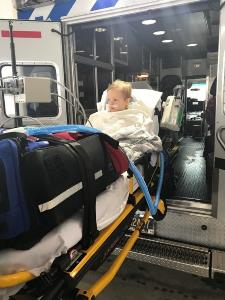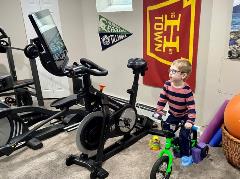Jude’s fragile start to life informed our conservative approach to COVID and self-quarantining. Born eight weeks early weighing 2 lbs. 10 oz., Jude spent his first 53 days in the NICU at Bryn Mawr Hospital, initially on breathing support. At 18 months, Jude was hospitalized for bronchiolitis and transferred from Bryn Mawr’s ER to Nemours Children’s PICU in Wilmington, DE during a snowstorm.


So when Jon and I started learning more and more about this new coronavirus—lung complications, acute respiratory distress, ventilator dependency—We. Freaked. Out. Despite the fact that Jude is now a robust, thriving four-year-old, the memory of your newborn baby struggling to breathe never leaves you. We flashed right back to the NICU, with its beeping machines and high flow nasal cannulas.
Jude’s early days shaped me as a mother, and that instant protective response has muscle memory. When you watch your child struggle to learn how to do things in the world that they were meant to have done in the womb, your heart aches in a way that’s indescribable. I stood guard at his Isolette, jumped at the sound of a cough or sneeze, and scrubbed my hands and forearms so many times a day that they cracked and bled.
So when the severity of COVID-19 became clear, we reflexively jumped into hyper-protective mode: Hours spent wiping down groceries with Clorox wipes. Not leaving our house for weeks at a time. Having everything delivered—groceries, toilet paper, pantry staples. Not letting anyone in the house. Waking in the middle of the night to check on Jude.
The transition to pandemic life was not a graceful one. One day bled into the next as we juggled work, parenting, and the obsessive wiping-down of every can of seltzer in the grocery delivery. The pace of the early lockdown days was not sustainable: Simultaneously working and parenting seven days a week, eating too much, drinking too much, not working out, and barely sleeping.
When I attempted to close my eyes at night, all the emotions that I buried throughout the day rose to the surface of my consciousness: Guilt over keeping Jude from his family and friends, but being too afraid to expose him to something that could attack his respiratory system. Guilt over sticking him in front of the TV again or leaving him to play by himself for hours on end so I could work. Anxiety over not working as many hours as I knew I should because it’s literally impossible to work and parent full-time.
 We adapted and eventually found our way, even if it wasn’t always pretty. We added some healthy meals—vegetables and lean proteins—into the sea of comfort food—carbs, cheese, cream. I squeezed in early morning workouts over Zoom with the trainers from my gym. On the mornings I didn’t, Jude and I would work out together during lunch.
We adapted and eventually found our way, even if it wasn’t always pretty. We added some healthy meals—vegetables and lean proteins—into the sea of comfort food—carbs, cheese, cream. I squeezed in early morning workouts over Zoom with the trainers from my gym. On the mornings I didn’t, Jude and I would work out together during lunch.
As we settled into our new normal, we began to recognize how fortunate we were compared to so many others. Jon and I were luckier than most with our jobs. As a financial advisor recruiter, Jon worked from home full-time pre-COVID, and continued to do so without issue. I seamlessly transitioned to being fully remote—given my prior travel, court appearances, and other meetings out of the office, I was already doing a fair amount of work at home. And, I had a dedicated office space. Many of my clients had travel restrictions through their companies, and expected Zoom meetings and mediations, which were easily accomplished from home.
Mission Control
 Jude, our only child, was used to entertaining himself for stretches of time, and he is old enough that he could have a snack or watch TV without hands-on supervision. Jon and I were largely able to juggle our work schedules and switch off with Jude, though some days were rockier than others. There’s nothing like having your four-year-old tell 100 of your colleagues to “Say excuse me before you start talking, Mommy,” after being asked to give an update on an upcoming program. Fortunately, it was a Women in The Law meeting, and many could relate to the comedic pitfalls of Zooming from home. If anything, they were relieved it didn’t happen to them!
Jude, our only child, was used to entertaining himself for stretches of time, and he is old enough that he could have a snack or watch TV without hands-on supervision. Jon and I were largely able to juggle our work schedules and switch off with Jude, though some days were rockier than others. There’s nothing like having your four-year-old tell 100 of your colleagues to “Say excuse me before you start talking, Mommy,” after being asked to give an update on an upcoming program. Fortunately, it was a Women in The Law meeting, and many could relate to the comedic pitfalls of Zooming from home. If anything, they were relieved it didn’t happen to them!
In June of 2020, we expanded our bubble to include my parents, my sister,, and her family. Our COVID crew—six adults, three kids, and two dogs—hunkered down for the summer at my parents’ beach house in Avalon, New Jersey. Each morning I walked five miles on the beach with my husband and sister, soaking in some much-needed Vitamin D. We ate healthier, slept better, and laughed more. We had our family there to watch Jude while Jon and I worked upstairs in separate rooms, uninterrupted for the entire day. Jude had his two cousins to play with, and he was thrilled. They swam in the pool out back, went for walks, and had some normalcy for the first time in months. It was truly idyllic. We knew this time was fleeting, as fall meant the return to isolation, so we met each day with presence and gratitude.
As September drew closer, the anxiety levels steadily creeped back up. Jude was starting at a new Montessori preschool, and the final week of summer was fraught with uncertainty. Every hour, we reassessed “the numbers”—the COVID infection rate, confirmed cases, any data available in and around Delaware County, Pennsylvania. We went back and forth over whether to pull him from school, hire a nanny, or return to our pre-summer mayhem of working full-time and parenting full-time while Jude raised himself with the help of Disney+ and Paw Patrol.
 Ultimately, we were comfortable with his school’s health and safety plan, the small class size, and the school’s commitment to mask wearing, social distancing, disinfecting regularly, and keeping the children as safe as possible. Jude went back to school and stayed healthy, made new friends, and learned new things.
Ultimately, we were comfortable with his school’s health and safety plan, the small class size, and the school’s commitment to mask wearing, social distancing, disinfecting regularly, and keeping the children as safe as possible. Jude went back to school and stayed healthy, made new friends, and learned new things.
We approached the holidays with an abundance of caution, choosing to keep Jude home for much of the season. While this brought a bit more chaos to our lives, I found myself oddly at peace with the ever-changing landscape of pandemic life. We typically host Thanksgiving, and I love entertaining. But I felt a profound calmness at the thought of watching the Philadelphia Thanksgiving Parade on TV, not cooking for days on end, and spending the day at home with my little family. Maybe we’d order Chinese food? Maybe we’d stay in our pajamas all day? Who cares! Turns out, my mom wasn’t so willing to let Thanksgiving traditions go by the wayside, and we had a traditional Thanksgiving dinner over Zoom. But I noticed a distinct shift in myself as I loosened my grip on expectations and accepted each day as it came.
As I am sure is true for all of us, the last year and a half tested, challenged, and pushed me to the edge of sanity. But it was also a time of intimacy, presence, and gratitude. Life would have been so different if I were separated from my family, caring for elderly parents, or standing by helplessly while a relative suffered the virus in isolation. The fact that we got so lucky—our health, family, and finances still intact—has taught me to take nothing for granted. 2020 forced me to slow down and appreciate the beauty of every day.
Pre-pandemic life was life at full throttle. Everything was go-go-go. But lockdown life gave us the opportunity to just BE. Not going to restaurants meant cooking meals as a family. With no museums to visit, we discovered some beautiful trails right in our neighborhood that had previously gone unnoticed. Not running from gymnastics to music class meant time to up our arts-and-crafts game. Less commitments on our calendar meant less stress, less chaos, and more of JUST US.
Being with Jude so intimately was like watching him grow up before my very eyes—the opposite of what you might expect being with someone every day. You would expect to not see the small changes over time. But, to me, they were magnified. Over lunch, I learned about his friends at school, his dream last night, what he played that morning while I was working, or any number of things that come across a four-year-old's mind.
When I took Jude to doctor's appointments, I was so impressed with how effortlessly he wore his mask, how mature he can be, and how brave he is. Doing speech therapy and occupational therapy at home via Zoom—typically done at school by the Delaware County Intermediate Unit—allowed me to see how his mind processes things and how far he has come. One night, when I was getting Jude to come up for dinner, I found him in my office at my desk, typing away. “I can’t come to dinner, Mom,” he said. “I’m too busy working.” I smiled, realizing that not only have I gained insight into his world, but he has a deeper understanding of mine.
The pandemic forever changed me—as a person, a mother, a wife, a lawyer. I strive to be mindful of the fact that my pandemic experience does not match the experience of so many others—those who have lost their jobs, their loved ones, their lives. I am more awake to the small but significant moments throughout the day; tiny details I missed when life moved at a faster pace. Most importantly, I am more cognizant of the suffering around me, and remember to treat myself and others with a bit more compassion, patience and grace.
 Lynne O. Ingram is a member of Campbell Conroy & O'Neil, P.C. She is a seasoned trial lawyer with a diverse civil litigation defense practice. Lynne specializes in defending catastrophic, high exposure losses, and has significant experience in matters involving gas fires and explosions. She represents clients in cases across the United States, through all stages of litigation. Lynne works with clients in a broad range of industries, including construction, hospitality, insurance, medical, retail, and product design and manufacturing. Her practice areas span commercial and construction litigation, mass torts, personal injury/negligence, and premises and products liability defense. Lynne is admitted to practice in state and federal courts in Pennsylvania, New Jersey, Florida, and Maryland.
Lynne O. Ingram is a member of Campbell Conroy & O'Neil, P.C. She is a seasoned trial lawyer with a diverse civil litigation defense practice. Lynne specializes in defending catastrophic, high exposure losses, and has significant experience in matters involving gas fires and explosions. She represents clients in cases across the United States, through all stages of litigation. Lynne works with clients in a broad range of industries, including construction, hospitality, insurance, medical, retail, and product design and manufacturing. Her practice areas span commercial and construction litigation, mass torts, personal injury/negligence, and premises and products liability defense. Lynne is admitted to practice in state and federal courts in Pennsylvania, New Jersey, Florida, and Maryland.